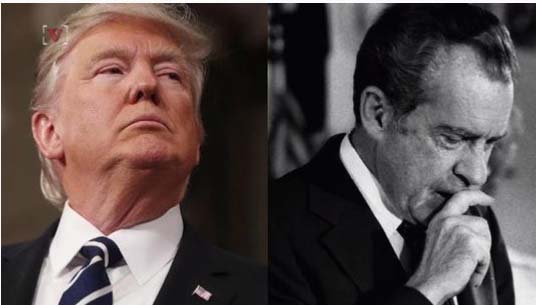
You can hardly turn on the television these days without coming across a solemn conversation drawing parallels between the presidencies and personalities of Richard Nixon and Donald Trump. Rather than rely on the opinions of the assembled punditry, I turned to journalist John Farrell, whose excellent and quite readable biography of Nixon was recently published to admiring reviews. Here are some of the more intriguing parts of my interview.
I began by asking Farrell whether, in common with other Nixon biographers, he saw the 37th president as a tragic figure:
"I see him as a flawed individual with many gifts; marbled like a rib steak with resentments and insecurities and feelings of inferiority -- all legacies of a painful, almost Dickensian childhood."
And there was this:
"Nixon was Iago to his own Othello: whispering in his own ear and rousing his own insecurities. 'He could not find the locus of his achievements,' Henry Kissinger wrote. And, 'Triumph seemed to bring no surcease to this tortured man. ... It was hard to avoid the impression that Nixon, who thrived on crisis, also craved disasters.' "
The portrait of Nixon that comes across in Farrell's book is of a man driven by resentment, who is prickly and infuriated by small slights, especially from reporters or those he considers elitists. I asked how one so thin-skinned could have risen to the presidency.
"Nixon had very poor interpersonal skills. He was an introvert in an extrovert's profession, as he told author Garry Wills. He learned very early on to rehearse, memorize and act. But constantly performing brought on great stress. And challenges threatened his always fragile sense of control. 'I have a fetish about disciplining myself,' he once said. Most of the time he could control himself, but a temper tantrum, an episode of drink, even a physical assault on an aide, were lurking possibilities. JFK once noted that he felt sorry for Nixon, who had to think about who and what he was at every moment while he, Kennedy, could just be himself."
Farrell went on to quote Nixon's close aide, H.R. Haldeman:
"'He was conscious every minute of self-discipline, therefore he couldn't relax. ... Such a man, in the pressures of the political world would see enemies -- most of them real -- everywhere; would be unable to defeat those enemies by a normal 'easy' attitude that inspires popularity, would despair at his lack of natural charisma and realize that if he was to win he would have to attack and destroy.'"
The scandals of the Nixon administration have become the standard by which all others are judged. I asked Farrell why.
"Watergate was compelling because of the drama; because it was long-running, lasting for more than two years; because it ended as it did -- with the first presidential resignation -- and because it involved such a divisive, alienating yet always fascinating character like Nixon.
"It was a huge break from the All Together Now ethos of World War II and the Cold War, when such sins, and far worse, were tolerated in politics as justified responses to existential totalitarian threats."
And of course I had to ask him to compare the Watergate scandal with the allegations against Trump:
"Obviously, this week's developments were game changers. We now have evidence that the president, while in discussions with the FBI director about his future employment, urged him to go easy on the investigation into Michael Flynn and the Russia connection. And then, when the director proceeded to aggressively investigate, the director was fired. This fits into a pattern of dodging, secrecy, lying and dissembling by Trump and his staff, which reminds me vividly -- as someone who has studied the Nixon White House extensively -- of the behavior of Nixon and his aides. They acted like they were hiding something. So does Trump."
But the potential similarity of the two scandals does not lead Farrell to the conclusion that Trump and Nixon are essentially the same:
"Personally, the two men are different individuals. Nixon was a foreign policy scholar; he read books and wrote his own speeches and had clear cut goals and a savvy understanding of American politics. He could size up, seize and exploit a moment.
"Trump has Nixon's grandiosity, but displays it in a more vulgar manner. Nixon was always buttoned up and buttoned down. He could rail, on the tapes, and expose the presidential id like Trump does with his tweets, but in public he prided himself on professionalism.
"Both men, however, ran for president on platforms of grievance. They both had the talent of taking their own resentments -- and using them to identify fear, resentment and hatred among the voters, that they then tapped."
Still, perhaps we might find parallels in another point Farrell made about his subject:
"Whatever Nixon did wasn't enough; it would be stolen from him; the fates would favor richer, better educated, more handsome men. It gave rein to his primary political philosophy: expedience. And when challenged by the media, or by political or bureaucratic rivals, he turned to ugly hatreds: ranting about Jews, blacks, Mexicans, gays, the Irish, the Italians.
"It was not until the summer of 1974 that he came to that so very hard won lesson he voiced in his farewell speech to the White House staff. Those who hate you don't win unless you hate them, and then you destroy yourself.
"Not bad advice for America these days."
To which one can only add: Amen.
Comment by clicking here.
Stephen L. Carter is the William Nelson Cromwell Professor of Law at Yale, where he has taught since 1982. Among his courses are law and religion, the ethics of war, contracts, evidence, and professional responsibility. His most recent book is The Violence of Peace: America’s Wars in the Age of Obama (2011). He is an author and Bloomberg View columnist.


 Contact The Editor
Contact The Editor
 Articles By This Author
Articles By This Author